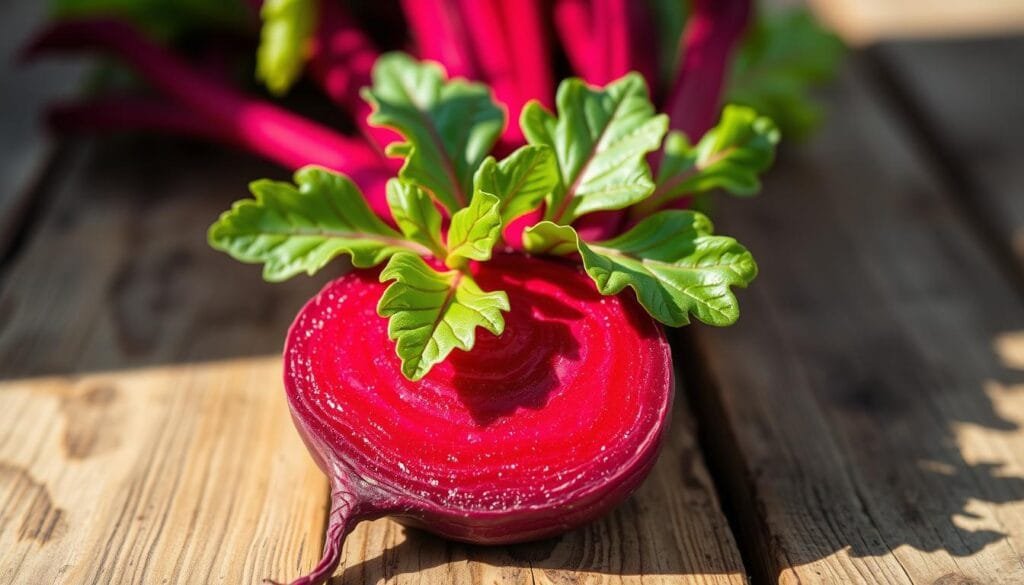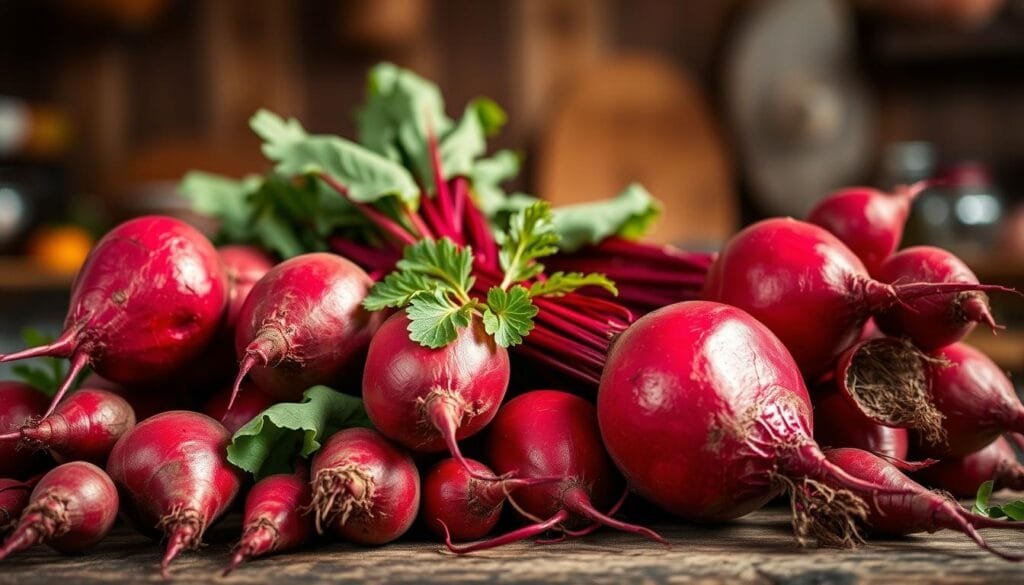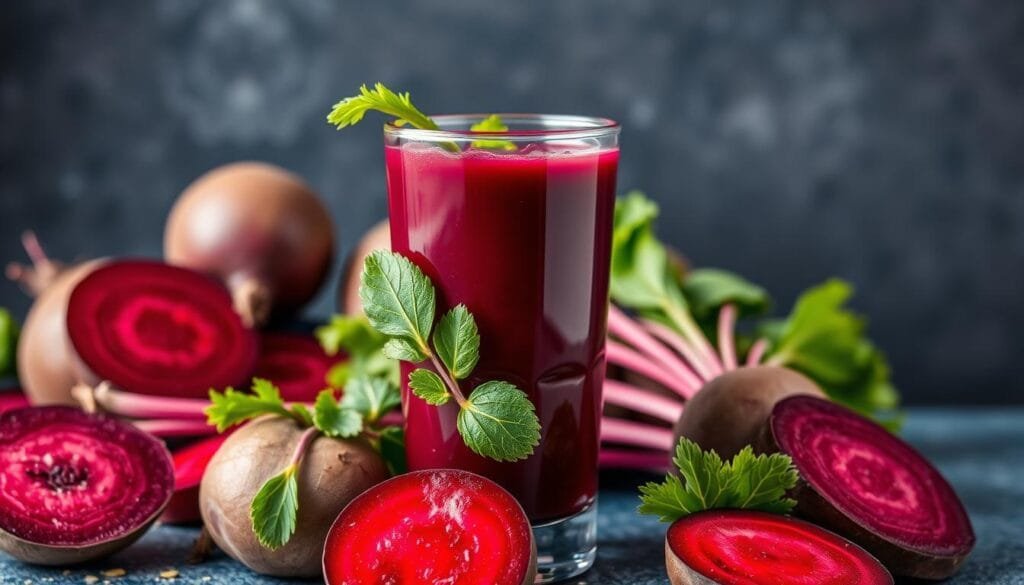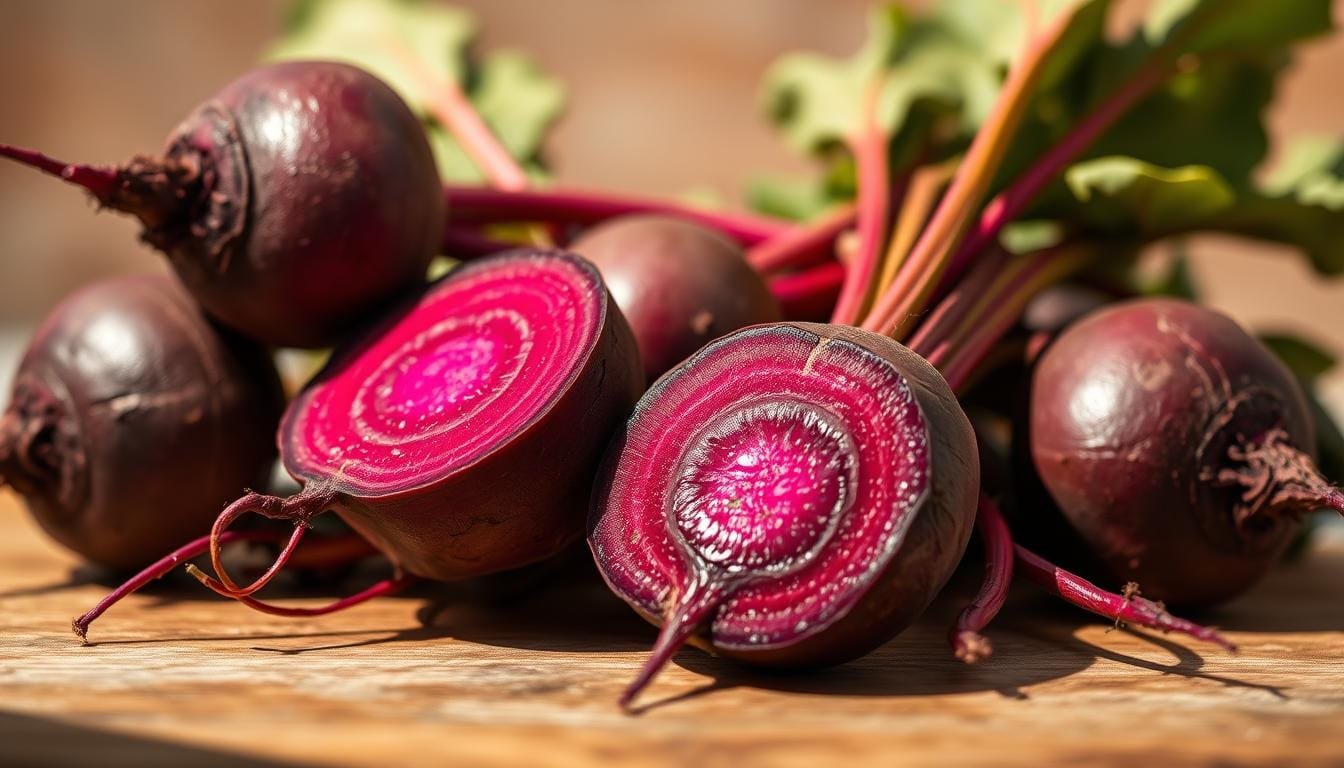Currently Empty: RM0.00
Beetroot, a root vegetable packed with nutrients, has been a staple in many cuisines around the world, including Malaysian cooking. But the question remains: can beetroot be a reliable source of iron? Iron is an essential nutrient that plays a critical role in transporting oxygen throughout the body and supporting overall health.
Beetroot is not only a good source of iron but is also rich in fiber, folate, manganese, potassium, and vitamin C, making it a nutritional powerhouse. For Malaysians looking to enhance their dietary intake of iron and other vital nutrients, incorporating beetroot into their meals can be a beneficial choice. Wellness Concept, a leading advocate for nutritional wellness, recommends exploring the various ways beetroot can be prepared and consumed to maximize its health benefits.
Key Takeaways
- Beetroot is a nutrient-rich food that is a good source of iron.
- Incorporating beetroot into Malaysian diets can help improve iron intake.
- Beetroot offers various health benefits, including improved heart health and enhanced exercise capacity.
- Beetroot can be a versatile ingredient in Malaysian cuisine.
- Wellness Concept promotes the use of beetroot for better nutritional health.
Understanding Beetroots: Nutritional Profile
The nutritional profile of beetroots makes them an excellent choice for health-conscious individuals. Beetroots are a rich source of essential nutrients that provide numerous health benefits.
Key Nutrients in Beetroots
Beetroots are rich in vitamins and minerals that are vital for maintaining a healthy body. They are an excellent source of dietary fiber, vitamins A and C, and potassium. The fiber content in beetroots supports digestive health and helps maintain steady blood sugar levels.
- Beetroots are rich in antioxidants and vitamins.
- They are a good source of potassium, an essential mineral.
Caloric Content and Macronutrients
One cup (136 grams) of boiled beetroot contains fewer than 60 calories, making beetroots a low-calorie food. The macronutrient breakdown of raw beets per 3/4 cup (100 grams) includes 43 calories, with 88% water content, 1.6 grams of protein, 9.6 grams of carbohydrates, and 0.2 grams of fat.
- Beetroots are relatively low in calories.
- They consist primarily of water and carbohydrates.
Are Beets High in Iron? The Truth About Their Iron Content
Beetroots have been a staple in many cuisines, but their iron content is often a topic of discussion. Beetroots are not only a vibrant addition to meals but also pack a nutritional punch, particularly in terms of iron.
Iron Levels in Beetroots Compared to Other Foods
Beetroots contain a notable amount of iron, although the exact amount can vary based on their size and preparation method. Compared to other iron-rich foods, beetroots hold their own, especially when consumed as part of a balanced diet.
| Food Item | Iron Content (mg per 100g) |
|---|---|
| Beetroots | 0.8 |
| Spinach | 2.7 |
| Red Meat | 3.5 |
Bioavailability of Iron in Beetroots
The bioavailability of iron in beetroots is enhanced by their high vitamin C content, which aids in the absorption of non-heme iron. Additionally, beetroots contain compounds that may protect iron from oxidation, potentially improving its stability and absorption.
Key factors that enhance iron absorption from beetroots include:
- Consuming beetroots with vitamin C-rich foods
- Cooking beetroots lightly to preserve nutrients
- The synergistic effect of copper content in beetroots
How Beetroots Support Blood Health
Beetroots are a nutrient-dense food that supports blood health by providing essential vitamins and minerals. They are rich in iron and folate, crucial for the production of red blood cells.
Beetroots and Red Blood Cell Production
Beetroots play a vital role in supporting red blood cell production due to their high iron content. Iron is a critical component of hemoglobin, which carries oxygen throughout the body. Consuming beetroot as part of a balanced diet can help ensure adequate iron levels.
Beetroots for Anemia Prevention and Management
For people at risk of anemia, incorporating beetroots into their diet can be beneficial. The combination of iron and folate in beetroots addresses two common nutritional deficiencies that lead to anemia. As recommended by healthcare professionals, consuming beetroots can be a complementary approach to managing anemia.

As supported by nutritional research, “A diet rich in beetroots can help regenerate blood cells and provide an adequate amount of oxygen to the whole body,” highlighting the importance of beetroots in maintaining healthy blood cells.
Cardiovascular Benefits of Beetroots
Beetroots have been found to offer numerous cardiovascular benefits. The nutrients present in beetroots contribute to improved heart health and reduced risk of heart disease.
Nitrates and Blood Pressure Regulation
Beetroot juice is rich in nitrates, which help regulate blood pressure. The nitrates in beetroot juice are converted into nitric oxide in the body, leading to the relaxation of blood vessels and improved blood flow. This can help lower blood pressure and reduce the risk of heart disease. Regular consumption of beetroot juice can be an effective way to support heart health.
Heart Health Improvements from Regular Consumption
Regular consumption of beetroots may lead to several heart health improvements. The antioxidants in beetroots, particularly betalains, help reduce oxidative stress and inflammation, key factors in the development of heart disease. Beetroots may also improve cholesterol profiles by increasing HDL (good) cholesterol and reducing LDL (bad) cholesterol levels. The improved blood flow resulting from beetroot consumption enhances oxygen delivery to the heart muscle, potentially reducing the risk of ischemic heart conditions.
- Reduces the risk of heart disease
- Improves blood flow and oxygen delivery
- Supports overall heart health
Other Health Benefits of Beetroots
Beetroots are rich in nutrients that offer a range of health benefits. Beyond their well-known iron content, beetroots provide several other advantages that can enhance overall health.
Anti-inflammatory Properties
Beetroots contain compounds that have anti-inflammatory effects, which can help reduce inflammation in the body. These compounds may contribute to improved health outcomes by mitigating the risk of chronic diseases associated with inflammation.
Exercise Performance Enhancement
The nitrates in beetroots have been shown to improve exercise performance by enhancing blood flow and reducing oxygen consumption. This makes beetroots a popular choice among athletes looking to boost their performance naturally.
Liver Protection and Detoxification
Beetroots are beneficial for liver health due to their content of antioxidants and betacyanin pigments. These compounds help protect the liver from oxidative damage and support its natural detoxification processes.
| Benefit | Description |
|---|---|
| Anti-inflammatory Effects | Reduces inflammation, potentially lowering the risk of chronic diseases. |
| Exercise Performance | Improves blood flow and reduces oxygen consumption, enhancing athletic performance. |
| Liver Protection | Protects the liver from oxidative damage and supports detoxification. |
Incorporating Beetroots into Malaysian Cuisine
Incorporating beetroots into Malaysian cooking not only boosts the nutritional content of meals but also introduces an exciting flavor dimension. Beetroots can be a versatile addition to various traditional dishes, enhancing both their nutritional value and visual appeal.
Traditional and Modern Malaysian Recipes with Beetroots
Beetroots can be incorporated into traditional Malaysian recipes such as stir-fries and soups. For example, beetroot leaves can be cooked like spinach, adding a nutritious twist to familiar dishes. Modern recipes can also benefit from beetroots, such as in salads or as a natural food coloring.
Cooking Methods That Preserve Nutrients
To maximize the nutritional benefits of beetroots, gentle cooking methods are recommended. Steaming, roasting at moderate temperatures, or light sautéing are ideal. Cooking beetroots with their skin on and peeling afterwards helps retain more nutrients. For busy Malaysians, pressure cooking can significantly reduce cooking time while preserving health benefits. For more information on healthy cooking, you can contact Wellness Concept at +60123822655.

Beetroot Juice: Benefits and Preparation

Beetroot juice is increasingly being recognized for its role in supporting cardiovascular health. Drinking beetroot juice can have various health benefits, including lowering blood pressure. According to a 2014 study, consuming about 250 ml of beetroot juice daily can have a positive impact on cardiovascular health.
Making Fresh Beetroot Juice at Home
Making fresh beetroot juice at home is relatively simple. It involves blending beetroots with water and straining the mixture to obtain the juice. This process helps retain the nutrients and ensures the juice is fresh.
Recommended Daily Intake
While there are no official guidelines for the daily intake of beetroot juice, research suggests that 250 ml (about one cup) is effective for blood pressure benefits. The ideal amount can vary based on individual health needs and the effects desired. For athletic performance, consuming 70-500 ml of juice 2-3 hours before exercise is recommended.
Potential Side Effects and Precautions
While beetroots offer numerous health benefits, it’s essential to be aware of their potential side effects. Consuming beetroots can lead to certain reactions in some individuals.
Beeturia and Other Common Reactions
One common side effect of beetroot consumption is beeturia, a harmless condition where urine turns pink or red due to the betalain pigment. Some people may also experience gastrointestinal discomfort or allergic reactions.
Who Should Limit Beetroot Consumption
Certain individuals should consume beetroots with caution. For instance, people with a history of calcium oxalate kidney stones should limit their intake due to the high levels oxalates in beets. Additionally, individuals taking medications for hypertension should consult their healthcare provider, as the nitrates in beetroots may also affect blood pressure.
Conclusion: Beetroots as Part of a Balanced Malaysian Diet
Beetroots offer a range of health benefits that can complement traditional Malaysian eating habits. With their moderate iron content, beetroot can be a valuable addition to the Malaysian diet, supporting overall health and well-being. The versatility of beetroots allows them to be incorporated into various dishes, from salads to main courses, or consumed as a juice for maximum nutrient absorption.
At Wellness Concept, we encourage a balanced approach to nutrition that incorporates nutrient-dense foods like beetroots while respecting individual health needs and cultural food traditions. For Malaysians concerned about iron intake and anemia prevention, beetroots can be part of a comprehensive approach that includes other iron-rich foods. You can learn more about the nutritional benefits of beetroots by visiting our blog at Wellness Concept Blog. For personalized nutritional guidance, contact us at +60123822655.
About Wellness Concept
Wellness Concept is committed to empowering Malaysians with the knowledge and tools to take control of their health and wellbeing. As a leading nutrition and health consultancy in Malaysia, we provide evidence-based nutritional guidance tailored to Malaysian dietary patterns and health needs.
Our team of qualified nutritionists specializes in creating personalized nutrition plans that incorporate nutrient-dense foods like beetroots to address specific health concerns such as anemia, blood pressure, and inflammatory conditions. By doing so, we help people achieve the benefits of a balanced diet.
We offer one-on-one consultations, group workshops, and corporate wellness programs designed to help Malaysians optimize their health through dietary and lifestyle modifications. Individuals may also benefit from our expert advice on managing specific health conditions.
For personalized nutrition advice or to schedule a consultation, contact us via WhatsApp at +60123822655 or visit our center during business hours: Monday to Friday, 9:30 am-6:30 pm, and Saturday and Sunday, 10 am-5 pm.
FAQ
What are the health benefits of consuming beetroots?
Beetroots are rich in essential vitamins, minerals, and nitrates, which can help lower blood pressure, improve heart health, and boost exercise performance. They are also a good source of antioxidants and anti-inflammatory compounds.
Can beetroots help alleviate anemia?
Yes, beetroots are a good source of iron, which is essential for healthy red blood cells. Consuming beetroots can help support red blood cell production and alleviate anemia.
How do beetroots affect blood pressure?
The nitrates in beetroots are converted into nitric oxide in the body, which helps to relax and dilate blood vessels, improving blood flow and lowering blood pressure.
Are there any potential side effects of consuming beetroots?
Some people may experience beeturia, a harmless condition where the urine turns pink or red after consuming beetroots. Additionally, individuals with kidney stones or oxalate sensitivity may need to limit their beetroot consumption.
Can beetroot juice be consumed daily?
Yes, beetroot juice can be consumed daily, but it’s recommended to start with a small amount (about 100-200ml) and gradually increase as needed. It’s also essential to consult with a healthcare professional before making any significant changes to your diet.
How can beetroots be incorporated into a Malaysian diet?
Beetroots can be added to traditional Malaysian dishes such as salads, curries, and soups. They can also be pickled or roasted as a side dish. Beetroot juice is another popular way to consume beetroots.
Are beetroots suitable for everyone?
While beetroots are generally considered safe, individuals with certain health conditions, such as kidney disease or oxalate sensitivity, may need to limit their consumption. Pregnant or breastfeeding women should also consult with their healthcare provider before consuming beetroots.



